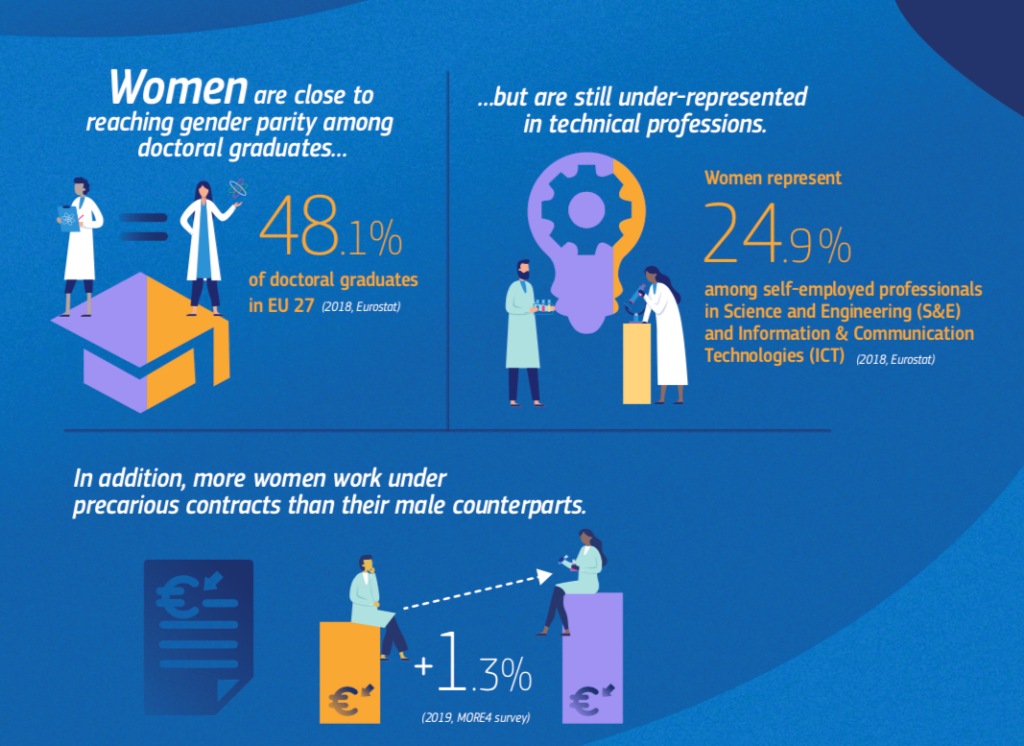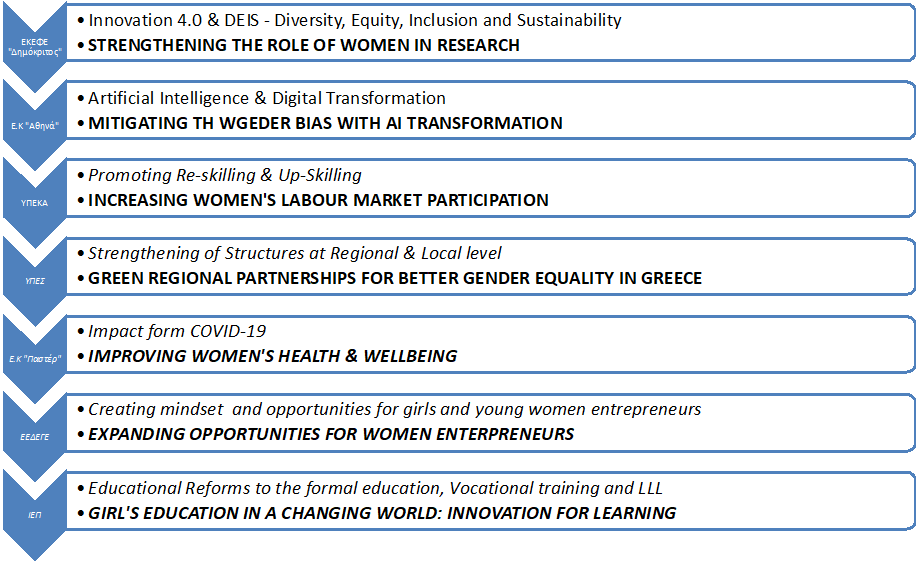It has been widely recognized that the competitiveness, innovativeness and social cohesion in the European economy are heavily dependent on the strategic and efficient use of digital and green technologies as well as on the knowledge, advanced skills, and capabilities of the European labour force and citizens, both men and women.
Fragilities remain…
While recovery from recent financial crisis and COVID-19 is underway, it is still fragile as the international context remains uncertain and unemployment for Women still remains unacceptably high. There are indications of rising cost pressures, we need to increase our investment in RDI and the innovation performance of our enterprise base, we need to address emerging skills issues and step-up investment in workforce development and we need to build resilience in our enterprise base in terms of productivity, and in our export and investment markets. We must continue to carefully implement the policies necessary to deliver sustainable employment and growth over the longer term.
As stressed by Ms. Mariya GABRIEL – European Commissioner for Innovation, Research, Culture, Education and Youth (European Commission. Directorate General for Research and Innovation., 2021) “we have an opportunity to shape the recovery to make it greener, fit for a digital world, and more inclusive. Women’s full participation in R&I is thus crucial for Europe’s Post-COVID recovery. There is no sustainable recovery if it is not gender-sensitive”.

At the same time, SHE FIGURES 2021 (European Commission. Directorate General for Research and Innovation., 2021) data show some positive trends, with almost gender parity at PhD graduate level and a slight increase in the proportion of women holding the highest academic positions (26.2%) compared to the last edition (24.1%). However, when looking at the representation of women doctoral graduates in specific fields of study, such as Information and Communication Technologies (ICT) and Engineering, Manufacturing and Construction, these numbers remain as low as 22.4% and 30%, respectively. The lack of women in these fields translates into biased R&I output, loss of talent and growth opportunities. Across all countries, in Greece (14.5%) observed one of the highest unemployment rates for tertiary-educated women and it is one of two EU-27 Member States and Associated Countries with a higher concentration of male researchers in Medical & Health Sciences were Greece (60.7% men and 50.9% women). However, in Greece, the European Investment Bank and Greek banks committed to providing EUR 500 million of loans to businesses8, EUR 100 millions of which will be earmarked for companies that support female entrepreneurship and leadership (European Investment Bank (ΕΙΒ), 2019).

One of the most important studies of WEF (WEF, 2018) denotes the problem of the new skills gap stated, “We are on the cusp of a Fourth Industrial Revolution. Developments in genetics, artificial intelligence, robotics, nanotechnology, 3D printing and biotechnology, to name just a few, are all building on and amplifying one another. The question, then, is how business, government and individuals will react to these developments. To prevent a worst-case scenario—technological change accompanied by talent shortages, mass unemployment and growing inequality—reskilling and upskilling of today’s workers will be critical.” The same
With high levels of unemployment and increasing inequality in many countries, there is a new focus on programs that are geared toward improving the workers’ abilities to function effectively, improving the employability of job seekers, increasing workplace efficiency and productivity, and enhancing personal, family and community functionality.
The current Action Plan based on the data received, mainly, from the major national stakeholders. The existing actions are in the field of the Public Sector, Education and Training , Employment, Entrepreneurship, health and wellbeing and revealed a surprising positive base for the aims of this Action Plan. To this end, the design of this Action Plan includes three significant procedures:
- Developing and attracting talent key for our growing economy…
The provision of incentives, across policy members to align their decisions with common strategic objectives and policy guidelines female entrepreneurship and on the re-skilling and up-skilling of the women in Greece.
- Improving our competitiveness is critical…
A better collaboration between private and public sector to define common actions in order to achieve specific objectives included in the Greece’s growth agenda.
- Delivering on the potential of our regions…
Create an open and transparent action plan, based on a continuous improvement including monitoring and evaluation procedures that will support a new approach to upgrading the attractiveness and competitiveness of all our regions, through the development of Regional Action Plans.
Also, the high female unemployment rate that the Greek economy is experiencing an indication of the high female participation rate in the labour market that cannot be absorbed because of gender discrimination.
But this document, intends not only to raise all the above-mentioned issues but to start confronting the problem with recommendations such as:
- Nurturing a strong female talent pipeline
- Leveraging Greece’s diverse talent
- Supporting workforce up-skilling to enhance digital adoption
- Fostering entrepreneurship based on the innovation
- Building labour mobility pathways to fill high demand occupations
- Inspire girls to pursue STEM studies and careers and encourage better gen-der balance by promoting a stronger role of women
Outlining key recommendations from all the partners, the following document presents how, through a structured methodology, we can increase the Female Talent in that will create the path which will help the Greek Public and Private sector to advance in STEM, advance skills, entrepreneurship and employment in our country.

The model for the innovation lab reflects the work carried out by more and more of the alliance members joining in since year 2014 and moulding extensive context research, survey and analysis of the needs of the target group, stakeholders mapping, interviews, collection and analysis of international good examples, incorporation of the UN Women´s Innovation Strategy aimed at removing the barriers to women and girl’s advancement in innovation, technology and entrepreneurship and incorporating the 2030 Agenda for Sustainable Development Goals and linking to the EU strategic priorities and the EU Post-Covid Recovery Plans.
#GIL4W will create a space where members can share tools, lessons learned, business bases and rapidly push forward innovative practices. They are encouraged to set their own specific targets to:
- Make a high-level corporate commitment to adopt a gender-responsive approach to innovation
- Design innovations that include women as service and innovation providers as well as end users
- Adapt implementation approaches to ensure innovations meet the needs of women
- Evaluate gender-responsive impacts by using a data-driven approach
- Scale innovations that provide sustainable solutions to meet the needs of women and girls.
To achieve this, the main objectives of #GIL4W are:
- To create an appropriate platform for the development of high-tech entrepreneurship in the digital economy
- To support research and innovation and that is the basis for the creation of start-ups,
- To transfer the benefits of growth to the rest of the economy,
- To create the conditions for equal participation in the new environment that is shaped by the constant evolution of ICT and the diffusion of benefits across society with a special focus on female talent.
Our approach relies on the following three main priorities:
- Our common belief is that promoting innovation is a vital part of the country’s digital and green transformation.
- On the need of a better collaboration between public & private sector stakeholders.
- On our willingness to work for an inclusive growth that promotes female talent and the reproduction of inequalities and hierarchies that prevail in the labour market.
It is very critical that #GIL4W has to be starkly responsive to the pandemics and COVID-19 and the financial crisis’ impact on female labour market. To this end, all the members are willing to contribute with their resources and expertise in ad- dressing current challenges, valorising research and AI and respective market potential.
All the members of #GIL4W Initiative agree to cooperate for achieving the Goals through coordination and in complementarity so as to generate synergies supporting youth’s employment in Greece by use of Digital and Green technologies.
It is expected that the cooperation on the basis of a complementary knowledge and competence basis, will produce the synergies needed and the implementation of the targeted actions will have a multiply effect on the impact of employment opportunities for women in Greece.
The core concepts
A lab is a space for people who represent a system and who are influenced by a system to come together and co-create.
An innovation lab for women is a place where realities of the present and concepts for the future are knit together with technology, storytelling and experimenting in a gender sensitive way to bring to life bold new ideas / products / services that address societal challenges.
We include four main foci – called “Pillars” – which form the framework around which #GIL4W operates.
Each of the Pillars form a thematic focus on which #GIL4W is committed to innovating based on our priorities described below. #GIL4W intends to become a co-working space – both virtual and physical – in which new ideas can be explored, in which hands-on project management takes place, and in which lessons learned are documented and shared with all the members. Innovation Labs are also a space from which the scaling of existing good practices can emerge.
- CONNECT – Strategy: What to do?
• innovation from secondary school through the career pipeline
• product development
• skills development
• services development - COLLABORATE – How to do it?
• health, AAL
• renewable & Blue Energy
• environment
• climate
• digital, AI, industry, space
• food, bio agriculture
• culture, creative industries
• ICT, Green ICT, intelligent prod-ucts
• media & digital media
• Public sector & social innovation
• Smart cities & mobility - GROW – Who can help?
• Community
• Financing
• Alternative financing
• Role models
• Mentors - IMPACT – How to do it?
• Dissemination
• Networking with industry elites Global collaboration
• Economic vitality Good Examples
According to the already defined aims, the following targets have been de-fined and relevant need for disruptive reforms were defined by all the founding members:
- Take advantage of opportunities from rapidly evolving technologies.
- Emphasis on skills and promotion of Female talent
- Addressing the problem of women’s participation in Digital & Green Economy
- Strengthening of the Structures at Regional and Local level
- Development of International Cooperation
- Integration of Best practices to our National initiatives

In terms of policy areas interventions, our actions will be focused on:
- Formal, vocational and Lifelong Learning
- Career Counselling and Guidance
- Up-skilling and Re-skilling focusing on an accreditation of the acquired skills
- Employment
- Entrepreneurship
- Digital and Green innovation
- Reconciliation of family and working life
- Actions for raising awareness.
These are reflected in the priorities we have set ourselves in this new Action Plan for 2021-2025 are set out below. The six disruptive reforms which will deliver substantial new initiatives which reflect the key priorities of #GIL4W and that will have a transformative impact on the capacity of our members to help women and girls in Greece to benefit of the Digital and Green emerging economies. The above-mentioned approach, led us to define the following seven thematic priorities:

The present action plan is based, as mentioned before, on four pillars and eight priorities. For each pillar our founding members: Ministry of Labour & Social Affairs, ECWT, Athena RC “Athena” and NRSF “Demokritos” will be responsible for the line coordination and the achievement of strategic goals through actions, as well as for the continuous feedback and update of the Action Plan with actions in its policy area, aiming at building synergies in a horizontal and vertical way, with other stakeholders.
The Ministry of Labour and Social Affairs – Demography, Family Policy and Gen-der Equality is responsible for the monitoring and the assessment of the implementation of the described actions of the Action Plan, as well for the continuous feedback and improvement of it with new interventions and stakeholders.
According to the signed MoU:
- a Joint Management Committee, consisting of nine (9) members, of which the Chairperson is the Deputy Minister of Labour and Social Affairs, responsible for Demographic Policy and the Family, Mrs. Maria Syrengela, Vice President is the Director of ECWT Mrs. Eva Fabry, while the remaining seven (7) members will be appointed after a joint decision of all parties.
- The Joint Management Committee will be supported by the Executive Committee, responsible for the design and implementation of the Action Plan, coordinated by Dr. Pantelis Nikolaidis, an official of the Ministry of Interior and member representatives of all #GIL4W partners, whereas Thematic Committees of Special Subjects will be defined by a joint decision of all #GIL4W partners.
Having in mind the complexity of the approach and the needed collaboration of such a variety of stakeholders from both public and private sector and also under the European dimension, with scope the satisfaction of the needs and concerns presented #GIL4W will follow a two-level approach. The aim of such an approach will be to establish a strategic cooperation model for the application of technology and innovation at local and regional level. Towards this aim, a two-level approach will be followed.
The first level includes a cycle of events (raising awareness conferences, dissemination meetings, shadowing actions, workshops, consultations), through which several actors from different level and sectors will be involved, with the participation of good practices representatives from the European Partners, allowing sharing foreign experience among all relevant actors. This high number of regional events, combined with international conferences, is expected to attract participants to propose strategies for companies, government or social actors focused on women’ participation in the Digital and Green economy.
The second level will be focused mainly on a benchmarking process, through which the partners will build on the knowledge gained in the events and will point out the critical success factors from the presented good practices, adapted in the Greek context.
A quality assurance approach through the benchmarking process will lead to a new revision of the Action Plan and new actions will be launched.
Finally, the members will develop a national model concept, which will enable them to set-up activities they got to know during the lifecycle of the action plan and replicate it into other sectors and by other stakeholders or potential beneficiaries. The model for #GIL4W proposed by ECWT is built on a combination of approaches and the preparatory work has been carried out in the described activities since 2014: extensive context research, survey and analysis of the needs of the target group, stakeholders mapping, interviews, collection and analysis of international good examples, incorporation of the UN Women´s Innovation Strategy aimed at removing the barriers to women and girl’s advancement in innovation, technology and entrepreneurship and incorporating the 2030 Agenda for Sustainable Development Goals.
The above-described two-level approach will include a great number of decision makers and experts from the public and private sector and exchange experience between market segments. This approach guarantees added value and increase of knowledge about how innovation and growth could be enhanced by strengthening the participation of women and enhance the public debate about the challenges of involving women in new technologies. It’s expected to create new support schemes, a permanent network of private – public cooperation. In the long run the #GIL4W will lead to an increased awareness for new technologies, employment opportunities, growth and innovation issues among public sector, social actors and businesses.

The Expected Results
Through the proposed approach, the expected results are:
- Increased knowledge and enhanced public debate about the need to promote women’s employability based on the research and innovation
- Creation of a permanent network for exchange of best practices and experiences between partners through meetings, events, workshops, conferences and transfer of know-how and support measures
- An entrepreneurial environment for improved support for women participation to the Digital and Green economy
- Increase of the skills of women and girls for integrating female talent into the Greek labour market
The long-term impacts of the Action Plan are:
- Increased awareness (among company owners, of intermediary organisations as a policy issue, of Strategies on Advanced Skills and e-Leadership)
- Improved support to the Greek women company owners and financing schemes
- Increased number of successfully applied strategies for the participation of unemployed women
During the Initiative the following group categories, will be targeted:
✔ Girls and women of DEIS and high-risk groups
✔ Girls and women in typical, vocational education and lifelong training
✔ Unemployed women in general
✔ Women Employers, and SMEs owners
✔ Local / Regional Authorities
✔ National Structures responsible for Advanced Skills and e-Leadership
✔ Employment services
✔ Social partners
✔ Policy makers at a local, regional, National level
✔ Training providers, Educational institutions and Lifelong Learning Institutes
✔ Career counselling and guidance practitioners and services’ providers
